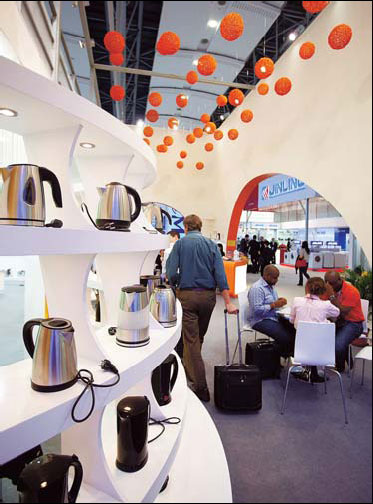Economy
Rising yuan stymies Canton Fair exports
By Qiu Quanlin (China Daily)
Updated: 2011-05-06 09:26
 |
Large Medium Small |
|
 Attendees browse various products during the Canton Fair in Guangzhou. The trade volume of export orders transacted during the fair amounted to $36.86 billion. [Photo/Agencies] |
GUANGZHOU - A number of factors, especially the appreciation of the yuan, prevented Chinese export-oriented companies from signing long-term orders with foreign businesses at this year's Import and Export Fair, which ended on Thursday.
That's according to a spokesman for the event, which is also widely known as the Canton Fair.
Up to 90 percent of the export orders signed during the event, the country's largest trade exposition, were short-term deals, according to the spokesman, Liu Jianjun.
"Both Chinese exporters and overseas importers have adopted a cautious approach toward signing long-term orders because of some uncertainty, especially over the rising value of the renminbi," Liu said.
The trade volume of export orders transacted during the fair amounted to $36.86 billion, an increase of 5.8 percent from the last event.
| ||||
Moreover, deals with buyers from the emerging markets in Brazil, Russia and India, which form the BRICS trading bloc with China and South Africa, increased by 30.1 percent.
The 109th Canton Fair, in Guangzhou, Guangdong province, saw the participation of 207,103 buyers from 209 countries and regions.
Besides the rising value of the currency, increased production costs and possible adjustments to foreign trade policies in the near future also hampered domestic exporters from clinching long-term orders with overseas buyers, Liu said.
"But the key factor is the rising value of the renminbi, which, as far as most Chinese exporters are concerned, will lower their profits in the future," Liu said.
The Chinese currency hit a record high of 6.4990 a dollar on April 29. However, it continued to weaken during the following days, with its central parity set at 6.5025 to the dollar on Thursday, according to the Xinhua News Agency.
Based on export deals signed at the fair, seen as a key barometer of China's trade development, export-oriented companies should adopt an active attitude to cope with the rising value of the currency, according to Wen Zhongliang, deputy director of the Department of Foreign Trade at the Ministry of Commerce.
"The rising value of the renminbi is an indicator of China's rapid economic development in recent decades. Chinese export-oriented companies should not worry too much about the negative effect it has brought about," Wen said.
He suggested Chinese exporters should fix the exchange rate or allow for fluctuations when signing long-term orders with overseas buyers.
Fu Keda, president of the Beyond Garments Co Ltd in Ningbo, Zhejiang province, said he insisted on allowing for changes in the exchange rate when signing long-term deals with overseas buyers.
"Transactions will be based on exchange-rate fluctuations from each quarter or half-year. That will allow us to avoid losses," Fu said.
In addition, Wen Zhongliang said Chinese manufacturers should focus more on upgrading their businesses and developing new customers in emerging markets.
| 分享按鈕 |



